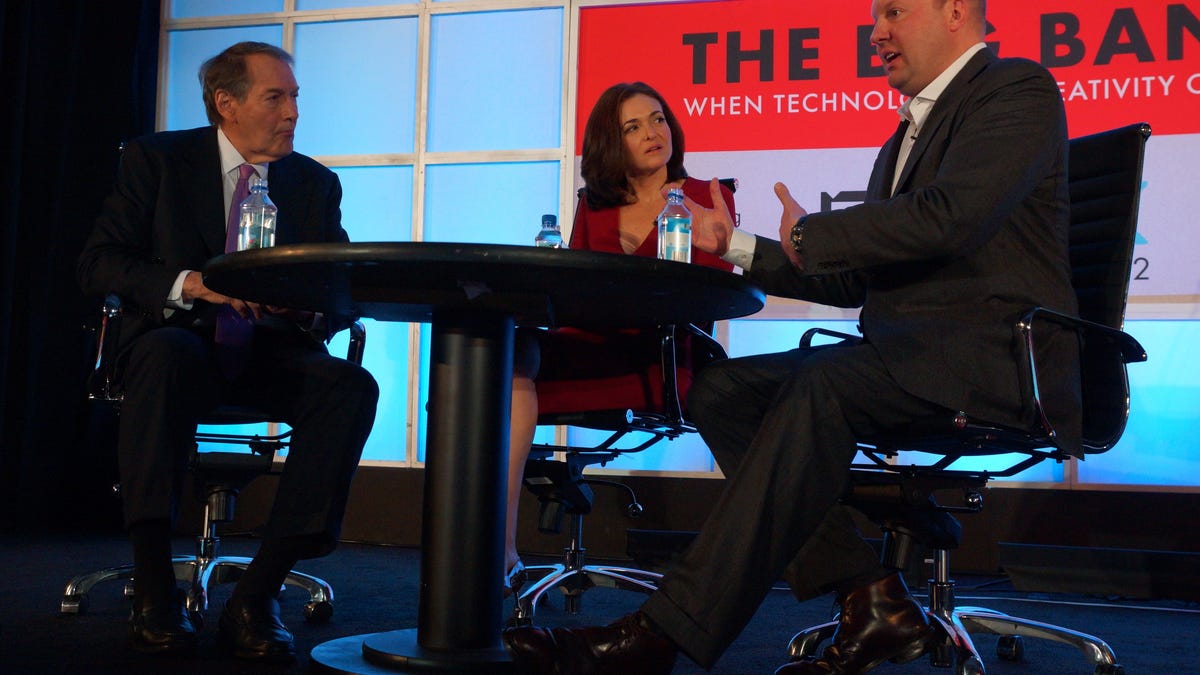Facebook: We're 'very focused' on putting ads in newsfeeds
COO Sheryl Sandberg, speaking with Marc Andreessen during a Charlie Rose interview, also said employees have shrugged off Facebook's stock-price collapse.

The two, speaking today during an interview with Charlie Rose at an advertising conference in New York, dismissed concerns that Facebook is struggling and said it's making strides in mobile.
"This is word of mouth at scale, and it's made possible through real identity ... on mobile devices we haven't seen before," Sandberg said. "Mobile is a huge opportunity for Facebook."
The big question, she noted, is what format mobile ads will take. Facebook, for one, is "very focused" on putting ads into users' news feeds in a way that gives marketers a "great return" and continues to drive engagement. And Facebook sees big opportunity in helping users find restaurants, services and other items through their friends.
Sandberg, asked if monetization is going slower than expected, said that "it's an evolution." And she said that Facebook employees, while "surprised and disappointed" by IPO reaction, don't let it impact their work performance.
"People think all of Facebook must be in tatters... but we're pretty good at moving forward," Sandberg said.
She declined to comment about what went wrong with the IPO and dismissed rumors she might leave Facebook, saying she loves her job and is staying.
Facebook has gone through rocky times since its IPO in May. The social networking giant's stock has tumbled about 42% from its $38 listing price amid persistent questions about its ability to grow and to make money on mobile devices. Chief among the worries is doubt about Facebook's mobile strategy, as well as concern about a slowdown in advertising.
There's no doubt that mobile is Facebook's future, with a significant number of its users accessing the site via smartphones or tablets. While taking steps to expand in mobility, such as rolling out Sponsored Stories for smartphones, Facebook still has a long way to go to squeeze money out of its growing mobile user base.
Andreessen, meanwhile, said successful companies tend to delay gratification, focusing on making the best products for their customers and then figuring out how to make money. He noted MySpace ultimately failed because it focused too much on making money while underinvesting in R&D.
"You want these companies taking risks," Andreessen said. "When tech companies turn conservative and stop making bets, that's when they go completely sideways."
His firm Andreessen Horowitz was an investor in Facebook, as well as other companies like Twitter, LinkedIn and Groupon.
Andreessen noted that he was dodging questions about IPOs "because people will get mad." The legendary Silicon Valley entrepreneur and venture capitalist noted that there's not "even any tiny little trace" of a tech bubble at this time.
Andreessen also said the original reason Google's Android operating system had momentum was because Apple priced its products too high. But Apple keeps driving down smartphone pricing by offering older model iPhone at discounted rates, he said.
"They're going for market share in a way I don't think they historically have been," Andreessen said.
And Andreessen said the future is for all media, such as videos and videogames, to move online and for a person's smartphone to become the control point for all other devices. He cited Apple's AirPlay as an indication of where technology is going. And Andreessen also expects a new wave of wearable consumer devices.
"The smartphone is the hub for those devices," he said.

